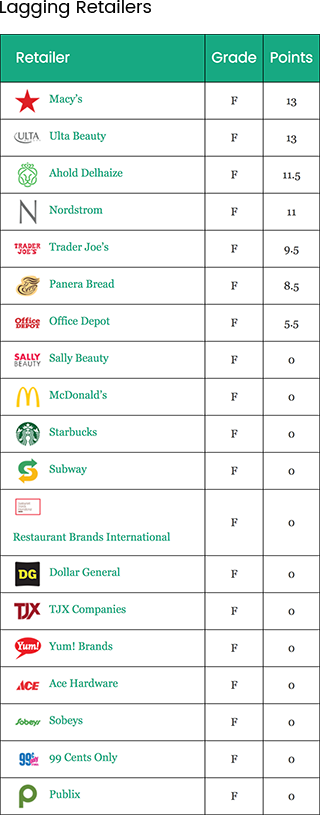By
ecoRI News staff
 A
recently released report by Safer Chemicals Healthy Families
reveals that major retail companies are making slow but meaningful progress at
improving the chemical safety of the products, food, and packaging they sell.
A
recently released report by Safer Chemicals Healthy Families
reveals that major retail companies are making slow but meaningful progress at
improving the chemical safety of the products, food, and packaging they sell.
However,
nearly half of those scored, including every restaurant chain evaluated, have
failed to take any public measures to help eliminate toxic chemicals from the
products they carry.
The third annual Who’s Minding the Store? A Report Card on Retailer Actions to Eliminate Toxic Chemicals evaluated and graded the chemical policies and practices of 40 of the largest North American retailers, including supermarket and fast-food chains.
The third annual Who’s Minding the Store? A Report Card on Retailer Actions to Eliminate Toxic Chemicals evaluated and graded the chemical policies and practices of 40 of the largest North American retailers, including supermarket and fast-food chains.
Four
retailers received the highest grades for their work to protect customers from
toxic products and packaging, setting the pace for the industry: Apple (A+),
Target (A), Walmart (A-), and IKEA (A-). In 2018, Walgreens, Rite Aid, and
Amazon were ranked “most improved,” with all three companies announcing
sweeping chemical safety policies over the past two months.
Woonsocket,
R.I.-based CVS Health received a
B+. Both Best Buy and Trader Joe’s have taken action on toxic chemicals in
thermal receipt paper and Mike Schade, Mind the Store Campaign director and
report co-author, said he would like to see CVS could join them in addressing
this issue.
Nearly
half of retailers evaluated for the 2018 report received a grade of F for
failing to announce policies or publicly report progress to assess, reduce, or
eliminate toxic chemicals in the products or packaging they sell.
Year-over-year results, however, reveal that retail chains have improved their chemical safety efforts after receiving poor grades — 72 percent of the 29 retailers evaluated in both 2017 and 2018 improved their scores by taking measures such as establishing new chemical safety policies, banning chemicals of concern from private-label brands, and expanding their chemical bans to new products.
Year-over-year results, however, reveal that retail chains have improved their chemical safety efforts after receiving poor grades — 72 percent of the 29 retailers evaluated in both 2017 and 2018 improved their scores by taking measures such as establishing new chemical safety policies, banning chemicals of concern from private-label brands, and expanding their chemical bans to new products.
Chain
restaurants were analyzed for the first time this year and significantly lag
behind other retailers in reducing chemical hazards. These companies have been
slow to announce chemicals policies and to publicly address toxic chemicals,
such as phthalates and per- and polyfluoroalkyl substances, in
packaging and other food contact materials.
Six fast food chains were evaluated representing 10 brands, with all companies earning Fs: Burger King, Kentucky Fried Chicken, McDonald’s, Panera, Pizza Hut, Popeyes, Taco Bell, Tim Hortons, Starbucks, and Subway.
Six fast food chains were evaluated representing 10 brands, with all companies earning Fs: Burger King, Kentucky Fried Chicken, McDonald’s, Panera, Pizza Hut, Popeyes, Taco Bell, Tim Hortons, Starbucks, and Subway.
“Companies
can prevent harm and protect public health by taking commonsense steps to phase
out toxic chemicals in everyday products,” Schade said. “Retailers have an
important role to play — they have both the power and the moral responsibility
to eliminate and safely replace toxic chemicals. They should stop letting
chemical corporations put public health at risk.”
Other
retail sectors with poor performance include dollar stores (average grade of
F), department stores (F), beauty shops (D-) and office supply stores (D-).
“Learning
and developmental disabilities now affect 1 in 6 children. Over a quarter of
these disabilities are linked to toxic chemical exposures,” said Tracy
Gregoire, Learning Disabilities Association of America’s Healthy Children
project coordinator.
“Prenatal and early-childhood exposure to harmful chemicals in consumer products and food packaging can lead to lifelong impacts and chronic health conditions. Major retailers have both the opportunity and the responsibility to become industry leaders by keeping toxic chemicals out of products and packaging to protect children’s minds and bodies.”
“Prenatal and early-childhood exposure to harmful chemicals in consumer products and food packaging can lead to lifelong impacts and chronic health conditions. Major retailers have both the opportunity and the responsibility to become industry leaders by keeping toxic chemicals out of products and packaging to protect children’s minds and bodies.”
Companies
selected for evaluation were among the top 40 North American retailers or
commanded the largest market share in one of 12 major retail sectors.